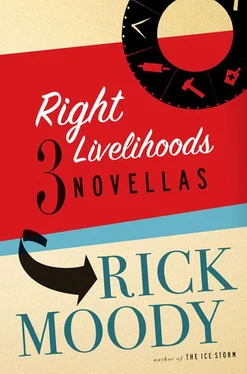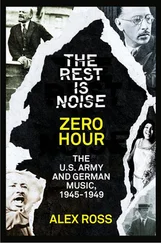“You haven’t produced shit,” said the bike messenger. “We need to see some results. You need to be e-mailing us some attachments, Mr. Lee, and so far we haven’t seen anything.”
“Just so incorrect,” I said.
And my father said, Never take the insurance bet; it’s just not a good bet .
“I’ve been taking some notes. Somewhere around here. There are all kinds of notes.”
There was the digital recorder, for example, but the batteries were dead.
“This conversation isn’t going very well,” replied the bike messenger. “We have also heard that you have been moving product given to you as part of our agreement.”
“There’s just no way!”
“Don’t make us have to remind you about the specifics of your responsibilities.”
“Give me a break,” I said. “I’m smarter than that.”
Now the bike messenger flung open the door that led out beyond my supply closet. As if I had forgotten there was a world out there. And standing out in the hall was Tara from the tits and lit magazine, except she looked really disheveled, like she didn’t want to be seen by anyone else in the hallway, and I said, “Tara, what are you doing here? I thought I had at least another couple weeks—”
“Look, you said you had the dropper; I don’t know anything about all this. I gave you the money, so can I please just have the drugs? Then I’ll get the fuck out of here.”
I made some desperate pleas to the Cortez employee, looking at him looking at Tara, and Tara stood and watched. I stalled, demanded to know if there was a way for me to be sure that these guys, the bike messenger and Tara, weren’t just figments of some future event that I was now “remembering,” according to that theory about Albertine.
“Did you or did you not assign me an article about Albertine?”
Tara said, “Just set me up and let me get out of here.”
And then Bertrand, the guy who doled out the habitable spaces in the armory, he got into the act too. Standing in the doorway, covered in grime, like he’d just come from his job at a filling station, except that as far as I knew it was just that Bertrand was an addict and had given up on personal hygiene. He gazed at me with make-believe compassion.
“Kevin, listen, we’ve given you chances. We’ve looked the other way. We’ve been understanding for months. We’ve made excuses for you. We pulled you out of the gutter when you were passed out there. But people living here at the armory are afraid to walk by your apartment now. They’re just afraid of what’s going to happen. So where does that leave us?”
Even Bob, my early source of information, was standing behind Bertrand, his hands on his hips. Trying to push past the throng of accusers, to get to me.
This was a moment when thinking carefully was more important than hallucinating. But because of the extremely dangerous amount of Albertine that was already overwhelming both my liver and my cerebral activity, reality just wasn’t a station that I could tune. What I mean is, I went down under again. Right in front of all those people.
Soon I was hanging out on some sunporch in a subdivision in Massachusetts. All the houses, in whichever direction I turned, looked exactly the same. I bet they had electric fireplaces in every room. It was like CAD had come through with a backhoe, bulldozed the whole region into uniformity. I could remember each tiny difference, each sign that some person, some family, had lived here for more than ten minutes. Serena’s folks had a jack-o’-lantern on the porch. And over there was a guy with one arm mowing the common areas. That intoxicating smell of freshly cut grass. The sound of yellow jackets trying to get in through the screen.
Serena was reiterating that I had said something really scary to her at school today, and she needed to know if I’d said what I had said because of the panic thing. Were my symptoms causing me to say these crazy things, and if so, wouldn’t it be better if I told someone what was happening instead of carrying it around by myself? She knew, she said, about really dangerous mental illnesses, she knew about these things and she wanted me to know that I would still be her friend, her special friend, even if I had one of those mental illnesses; so I was not to worry about it. And now would I please try to explain.
“Listen, I know what I said, and there’s no reason you should believe me,” I tried, “but the fact is that the only reason I can explain to you about the future is because I’m in the future . And in the future I know how much you mean to me. In the future, this four months that we’re close, it keeps coming back around, again and again, like that day we were on Boston Common. It keeps coming back around. I could tell you all this stuff about the future, about New York City and how it gets bombed into rubble, about drugs, the epidemic that’s coming, I could tell you how strung out I’m going to get. But that’s not the point. Somehow you’re the point . Serena, you’re the trompe l’oeil in the triptych of the future, and that’s because you know that guy. Paley. So you have to believe me, even though I probably wouldn’t believe me if I were you. Still, the thing is, you have to tell him what I’ve told you. Maybe none of this will happen, this stuff; I sure hope not. Maybe it will all turn out different, just because I’m telling you. But we can’t plan on that. What we have to plan on is your telling Paley that he’s in danger.”
“Actually, Kevin, what I think we need to do is talk to your mom.”
The jack-o’-lantern on the porch, of course. It was autumn, which was bad news, which meant I was on the come down and in need of a boost, and the whole scene was swirling away into an electromagnetic dwindling of stories. Serena was gone, and suddenly instead of being back in my room at the armory, where, suspended in a lost present, I was about to be evicted from my supply closet, I was back doing my job, the job of journalist, and what a relief. I had no idea what day it was. I had no idea if I was remembering the past or the future, or if I happened to be in the present. Albertine had messed with all that. I was confused. So was the guy I was interviewing, who happened to be the epidemiologist with the theory about the Albertine crisis, the one I told you about earlier, except that he was no epidemiologist at all. That was just his cover story. Actually, he was the anthropologist Ernst Wentworth, and we were in his office at Brooklyn College, which wasn’t really an office anymore, because there were about thirty thousand homeless people living on campus. At night there were vigilante raids in which the Arabic people living on one quad would be driven off the campus, out onto the streets of the Hot Zone, where stray gunshots from Eddie Cortez’s crew took out at least two or three a night. It was trench war. No one was getting educated at Brooklyn College, and Wentworth was crowded into a single room with a half dozen other desks and twice as many file cabinets pushed against the windows.
He was having trouble following the interview. Me too. I couldn’t remember if I had already asked certain questions:
Q: Check. Check. Check. Uh, okay, do you know anything about the origin of Albertine?
A: No one knows the origin, actually. The most compelling theory, which is getting quite a bit of attention these days, is that Albertine
has
no origin. The physicists at the college have suggested the possibility that Albertine owes her proliferation to a recent intense shower of interstellar dark matter. The effect of this dark matter is such that time, right now, has become completely porous, completely randomized. Certain subatomic constituent particles are colliding with certain others. This would suggest that Albertine is a side effect of a space-time difficulty, a quantum indeterminacy, rather than a cause herself, and since she is not a cause, she has no origin, no specific beginning that we know of. She just
Читать дальше












